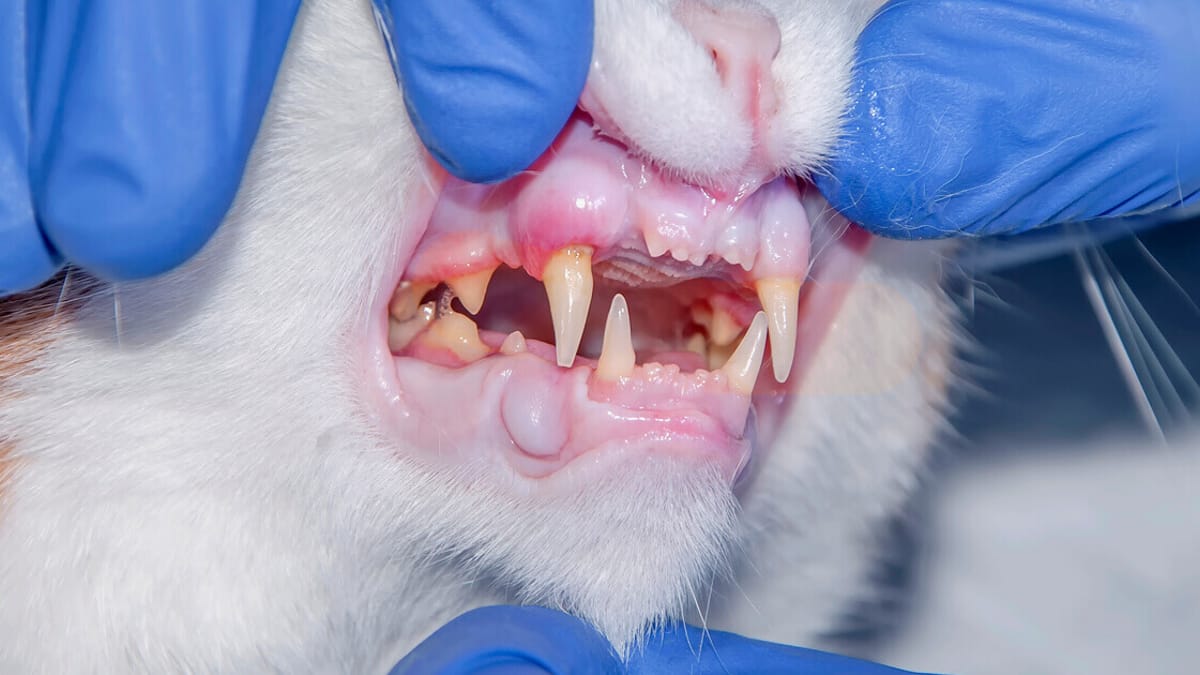The gingivitis in cats it is a very common inflammation of the gums that can affect specimens of any age and at any stage of their life.
It is a very painful problem, usually linked to poor oral hygiene and the presence of tartar on the teeth. Fortunately, feline gingivitis can be treated and prevented. Let’s see how.
What is gingivitis in cats?
Gum inflammation is an unpleasant and painful disorder for cats that often accompanies other dental disorders such as, for example, the presence of tartar.
Some breeds are genetically more predisposed to the formation of gum problems, but don’t worry: there are targeted treatments that can give relief to our moustached friends.
Symptoms of gingivitis in cats
If your feline’s gums are inflamed, there are usually a number of symptoms. At the beginning it is possible to notice a reddening of the gum in the part of it that is closest to the teeth. Especially in fair-skinned cats, the disease can be recognized quickly.
However, there are also other alarming signs to watch out for:
Why do cats get sick gums?
The causes of gingivitis in cats can be different, but in most cases, it is a disorder related to the formation of tartar or a poor dental hygiene. Also a component genetics it can cause Puss to have sore gums. Let’s see in detail.
Tartar and viral diseases
Gingivitis in cats can be favored by the presence of certain diseases and tartar.
Tartar is the mineralization of plaque, deriving from the substances produced by bacteria deposited on the teeth, which extends under the gum. The consequence of this accumulation is not only aesthetic, but can also cause disorders of the oral cavity such as inflammation of the gums.
Gingivitis can also be linked to some diseases such as:
- FORL (Feline Odontoclastic Resorptive Lesions),
- FeLV (Feline Leukemia),
- FIV (feline AIDS).
Genetically caused gingivitis
The cause of gingivitis in cats is not always clear and it is not excluded that genetic predisposition makes some specimens more prone to inflamed gums than others.
In fact, some breeds of cats seem to be affected more often by gingivitis. Here below:
Some cats have inflammation of the teeth, especially moles first two years of life. This specific clinical picture is called juvenile gingivitis, which can be traced back to genetic causes and a weak immune system.
How do you treat gingivitis in cats?

Depending on the cause and severity of the inflammatory disease, your veterinarian will need to decide on the most appropriate therapy for you.
While targeted care can quickly relieve the symptoms of acute dental problems, regular oral treatment is particularly important for the long-term health of your cat’s teeth and gums in the event of a chronic disorder.
Veterinary treatment
If your vet diagnoses gingivitis in your cat, the first step is to assess whether dental treatment is needed. If the feline also has tartar or other pathological changes to the teeth, treatment under anesthesia may be necessary.
In more severe cases, the extraction of one or more teeth may be necessary to relieve the animal’s pain.
Oral hygiene
Also daily dental hygiene it is especially important for cats suffering from gingivitis. Owners can use special dental care products to clean the cat’s teeth and remove tartar on a regular basis.
Unfortunately, however, there are few specimens that can tolerate a deep cleaning of the teeth on a daily basis. Furthermore, cats suffering from inflammation of the gums do not let themselves be approached precisely because of the pain.
Why are we talking about soft croquettes for cats with gingivitis?
If you have inflammatory gum disease, you may need to change your diet to offer your cat more moist foods that are easier to chew.
What to give to the cat in case of swollen gums? Gels and more…
Furthermore, it may be necessary to use a specific mouthwash for the cat’s mouth, a gel for dental care or snacks made in order to be able to give relief to a specimen from sore gums.
Natural remedies for inflamed gums in cats
Alternatively or in addition to cleaning the teeth, natural products or home remedies can often be used to alleviate or prevent this disorder. Without forgetting that in the most serious cases, a therapy based on antibiotic for gingivitis in cats.
In homeopathy, clove oil and sage leaves are especially recommended for the treatment of inflammation of the feline’s mouth.
As home remedies for mild gingivitis or as a support to drug therapy, chamomile-based anti-inflammatory teas and aloe vera paste can relieve symptoms.
Before administering any remedy to your cat, ask your vet for advice!
Course and prognosis of gingivitis
Gingival inflammation in cats is often chronic. Affected animals suffer from the disease constantly or at irregular intervals, although recovery can take place in stages.
In the case of chronic gingivitis, it is particularly important to take good care of the teeth and to have the animal undergo regular veterinary checks.
If left untreated, inflammatory gum disease can lead to complications such as tooth loss and severe inflammation, as well as limiting your pet’s diet.

